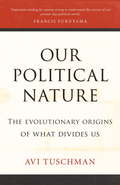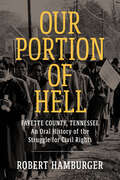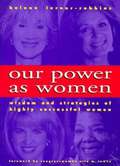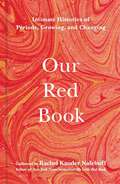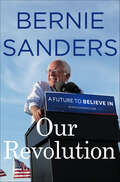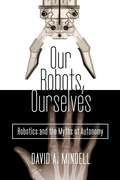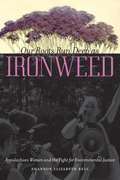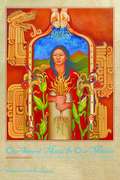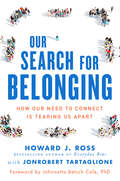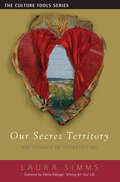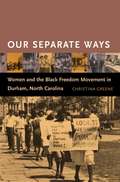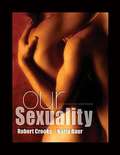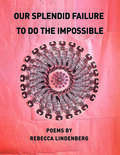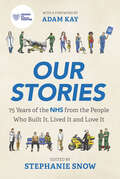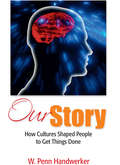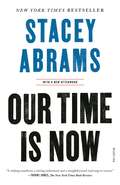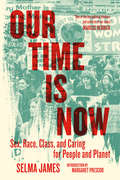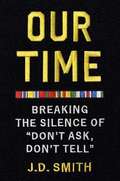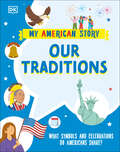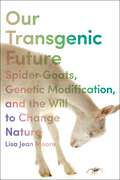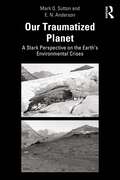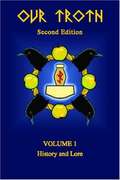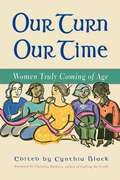- Table View
- List View
Our Political Nature
by Avi TuschmanThe first book to tell the natural history of political orientations. Our Political Nature is the first book to reveal the hidden roots of our most deeply held moral values. It shows how political orientations across space and time arise from three clusters of measurable personality traits. These clusters entail opposing attitudes toward tribalism, inequality, and differing perceptions of human nature. Together, these traits are by far the most powerful cause of left-right voting, even leading people to regularly vote against their economic interests. As this book explains, our political personalities also influence our likely choice of a mate, and shape society's larger reproductive patterns. Most importantly of all, it tells the evolutionary stories of these crucial personality traits, which stem from epic biological conflicts. Based on dozens of exciting new insights from primatology, genetics, neuroscience, and anthropology, this groundbreaking work brings core concepts to life through current news stories and personalities. For instance, readers will meet Glenn Beck and Hugo Chavez and come to understand the underlying evolutionary forces they represent. By blending serious research with relevant contemporary examples, Our Political Nature casts important light onto the ideological clashes that so dangerously divide and imperil our world today.From the Hardcover edition.
Our Portion of Hell: Fayette County, Tennessee: An Oral History of the Struggle for Civil Rights
by Robert HamburgerOur Portion of Hell: Fayette County, Tennessee: An Oral History of the Struggle for Civil Rights offers an unrivalled account of how a rural Black community drew together to combat the immense forces aligned against them. Author Robert Hamburger first visited Fayette County as part of a student civil rights project in 1965 and, in 1971, set out to document the history of the grassroots movement there. Beginning in 1959, Black residents in Fayette County attempting to register to vote were met with brutal resistance from the white community. Sharecropping families whose names appeared on voter registration rolls were evicted from their homes and their possessions tossed by the roadside. These dispossessed families lived for months in tents on muddy fields, as Fayette County became a “tent city” that attracted national attention. The white community created a blacklist culled from voter registration rolls, and those whose names appeared on the list were denied food, gas, and every imaginable service at shops, businesses, and gas stations throughout the county. Hamburger conducted months of interviews with residents of the county, inviting speakers to recall childhood experiences in the “Old South” and to explain what inspired them to take a stand against the oppressive system that dominated life in Fayette County. Their stories, told in their own words, make up the narrative of Our Portion of Hell. This reprint edition includes twenty-nine documentary photographs and an insightful new afterword by the author. There, he discusses the making of the book and reflects upon the difficult truth that although the civil rights struggle, once so immediate, has become history, many of the core issues that inspired the struggle remain as urgent as ever.
Our Post Office (Places in Our Community)
by Mary MeinkingThe post office is an important place in our community. Many community helpers work at the post office. Readers will learn about who works at a post office, what the workers do, and what makes a post office special. Simple, at-level text and vibrant photos help readers learn all about the post office.
Our Power as Women: The Wisdom and Strategies of Highly Successful Women
by Helene Lerner-RobbinsWhether read cover to cover, or browsed through for advice on a specific topic, this collection of inspiring essays by some of the world's best-known women is a marvelous resource to help you tap your own inner strength and power. Includes the insights of the author and those of: Patricia Ireland Olympia Dukakis anne Williamson Barbara Bush Geraldine Ferraro Ann Richards Gloria Steinem Paula Zahn
Our Red Book: Intimate Histories of Periods, Growing & Changing
by Rachel Kauder NalebuffA collection of essays, oral histories, and artworks about periods across all stages of life, gathered by the editor of the New York Times bestselling anthology My Little Red Book.After hearing a harrowing coming-of-age story from her great aunt, Rachel Kauder Nalebuff started gathering stories about menstruation in her family that had never been told. What began as an oral history project quickly snowballed: Rachel heard from family and friends, and then from strangers—writers, experts, community leaders, activists, young people, and other visionaries—about the most intimate physical transformations in their lives. Our Red Book takes us through stories of first periods, last periods, missing periods, and everything about bleeding that people wish they had been told. Weaving together powerful voices—from teenagers, midwives, Indigenous scholars, Olympic athletes, incarcerated writers, disoriented fathers, elected leaders who fought to make period products free, friends transitioning genders, grandmothers, and lovers—the book invites us on a collective journey of growth and change, with Rachel&’s own voice as a guide. The result is a people&’s history of menstruation, told through an array of perspectives and identities that span the globe. Gathered over twenty years, the collection takes stock of our shifting relationships to family, cultural inheritance, gender, aging, and liberation.
Our Revolution: A Future to Believe In
by Bernie SandersThe New York Times–bestselling memoir by the longest-serving political independent in Congressional history.When Bernie Sanders began his race for the presidency, it was considered a “fringe” campaign by the political establishment and the media—something not to be taken seriously. After all, he was just an Independent senator from a small state with little name recognition. His campaign had no money and no political organization, and it was taking on the entire Democratic Party establishment.By the time Sanders’s campaign came to a close, however, it was clear that the pundits had gotten it wrong. Bernie had run one of the most consequential campaigns in the modern history of the country. He’d received more than 13 million votes in primaries and caucuses throughout the country, he won twenty-two states, and more than 1.4 million people had attended his public meetings. Most important, he showed that the American people were prepared to take on the greed and irresponsibility of corporate America and the 1 percent.In Our Revolution, Sanders shares his personal experiences from the campaign trail. And for the millions looking to continue the political revolution, he outlines a progressive economic, environmental, racial, and social justice agenda that will create jobs, raise wages, protect the environment, and provide health care for all—and ultimately transform our country and our world for the better. For him, the political revolution has just started. The campaign may be over, but the struggle goes on.Includes photographs
Our Robots, Ourselves
by David A. Mindell"[An] essential book... it is required reading as we seriously engage one of the most important debates of our time."--Sherry Turkle, author of Reclaiming Conversation: The Power of Talk in a Digital AgeFrom drones to Mars rovers--an exploration of the most innovative use of robots today and a provocative argument for the crucial role of humans in our increasingly technological future. In Our Robots, Ourselves, David Mindell offers a fascinating behind-the-scenes look at the cutting edge of robotics today, debunking commonly held myths and exploring the rapidly changing relationships between humans and machines. Drawing on firsthand experience, extensive interviews, and the latest research from MIT and elsewhere, Mindell takes us to extreme environments--high atmosphere, deep ocean, and outer space--to reveal where the most advanced robotics already exist. In these environments, scientists use robots to discover new information about ancient civilizations, to map some of the world's largest geological features, and even to "commute" to Mars to conduct daily experiments. But these tools of air, sea, and space also forecast the dangers, ethical quandaries, and unintended consequences of a future in which robotics and automation suffuse our everyday lives. Mindell argues that the stark lines we've drawn between human and not human, manual and automated, aren't helpful for understanding our relationship with robotics. Brilliantly researched and accessibly written, Our Robots, Ourselves clarifies misconceptions about the autonomous robot, offering instead a hopeful message about what he calls "rich human presence" at the center of the technological landscape we are now creating. From the Hardcover edition.
Our Roots Run Deep as Ironweed: Appalachian Women and the Fight for Environmental Justice
by Shannon Elizabeth BellMotivated by a deeply rooted sense of place and community, Appalachian women have long fought against the damaging effects of industrialization. In this collection of interviews, sociologist Shannon Elizabeth Bell presents the voices of twelve Central Appalachian women, environmental justice activists fighting against mountaintop removal mining and its devastating effects on public health, regional ecology, and community well-being. Each woman narrates her own personal story of injustice and tells how that experience led her to activism. The interviews--many of them illustrated by the women's "photostories"--describe obstacles, losses, and tragedies. But they also tell of new communities and personal transformations catalyzed through activism. Bell supplements each narrative with careful notes that aid the reader while amplifying the power and flow of the activists' stories. Bell's analysis outlines the relationship between Appalachian women's activism and the gendered responsibilities they feel within their families and communities. Ultimately, Bell argues that these women draw upon a broader "protector identity" that both encompasses and extends the identity of motherhood that has often been associated with grassroots women's activism. As protectors, the women challenge dominant Appalachian gender expectations and guard not only their families but also their homeplaces, their communities, their heritage, and the endangered mountains that surround them. 30% of the proceeds from the sale of this book will be donated to organizations fighting for environmental justice in Central Appalachia.
Our Sacred Maíz Is Our Mother: Indigeneity And Belonging In The Americas
by Roberto Cintli RodríguezBrings together scholarly and traditional (elder) knowledge about the long history of maiz/corn cultivation and culture, its roots in Mesoamerica, and its living relationship to Indigenous peoples throughout the continent, including Mexicans and Central Americans now living in the United States.
Our School (Places in Our Community)
by Lisa J. AmstutzSchools are busy places! Lots of community helpers are needed to make a school run smoothly. Readers will learn about who works at a school, what the workers do, and what makes a school special. Simple, at-level text and vibrant photos help readers learn all about schools in the community.
Our Search for Belonging: How Our Need to Connect Is Tearing Us Apart
by Howard J. Ross JonRobert TartaglioneWe are living in a time of mounting political segregation that threatens to tear us apart as a unified society. The result is that we are becoming increasingly tribal, and the narratives of life that we get exposed to on a daily basis have become echo chambers in which we hear our beliefs reinforced and others' beliefs demonized. At the core of tribalism exists a paradox: as humans, we are hardwired with the need to belong, which ends up making us deeply connected with some yet deeply divided from others. When these tribes are formed out of fear of the "other," on topics such as race, immigration status, religion, or partisan politics, we resort to an "us versus them" attitude. Especially in the digital age, when we are all interconnected in one way or another, these tensions seep into our daily lives and we become secluded with our self-identified tribes. Global diversity and inclusion expert Howard J. Ross, with JonRobert Tartaglione, explores how our human need to belong is the driving force behind the increasing division of our world. Drawing upon decades of leadership experience, Ross probes the depth of tribalism, examines the role of social media in exacerbating it, and offers tactics for how to combat it. Filled with tested practices for opening safe and honest dialogue in the workplace and challenges to confront our own tendencies to bond with those who are like us, Our Search for Belonging is a powerful statement of hope in a disquieting time.
Our Secret Territory: The Essence of Storytelling (The Culture Tools Series)
by Laura SimmsLaura Simms is an acclaimed storyteller whom The New York Times has called a major force in the revival of storytelling in America. Laura's way of telling a story allows the mind of the listener to rest in a realm of imagination beyond thought, and stimulates its faculties of kindness and relationship. In this book she examines the spiritual and social aspects of storytelling, and its process of engagement.
Our Separate Ways
by Christina GreeneIn an in-depth community study of women in the civil rights movement, Christina Greene examines how several generations of black and white women, low-income as well as more affluent, shaped the struggle for black freedom in Durham, North Carolina. In the city long known as "the capital of the black middle class," Greene finds that, in fact, low-income African American women were the sustaining force for change. Greene demonstrates that women activists frequently were more organized, more militant, and more numerous than their male counterparts. They brought new approaches and strategies to protest, leadership, and racial politics. Arguing that race was not automatically a unifying force, Greene sheds new light on the class and gender fault lines within Durham's black community. While middle-class black leaders cautiously negotiated with whites in the boardroom, low-income black women were coordinating direct action in hair salons and neighborhood meetings. Greene's analysis challenges scholars and activists to rethink the contours of grassroots activism in the struggle for racial and economic justice in postwar America. She provides fresh insight into the changing nature of southern white liberalism and interracial alliances, the desegregation of schools and public accommodations, and the battle to end employment discrimination and urban poverty.
Our Sexuality (11th Edition)
by Karla Baur Robert CrooksThis is the most respected and authoritative college textbook available on human sexuality. Written in a direct, non-judgmental manner, this edition of OUR SEXUALITY has been thoroughly and carefully updated to reflect the most current research findings. It is the first college text to bring cutting-edge and in-depth emphasis on the impact of politics on sexuality. Crooks and Baur keep you interested with the most exciting, emerging research and coverage, and focus on strengthening healthy communication among partners. The authors also have revised their overall coverage on maintaining a responsible and healthy sexual relationship, with greater attention to diversity and inclusiveness.
Our Splendid Failure to Do the Impossible
by Rebecca LindenbergLiving in landscapes of ruin and ruination, memory and problematic nostalgia, Rebecca Lindenberg’s Our Splendid Failure to Do the Impossible plumbs the depths of disruption, decay, and how we go on when the world stops cold. Inspired by the speaker’s experiences of living with type 1 diabetes, the collection chronicles humanity’s daily fight for survival in a world that’s bent on destroying itself.Lindenberg centers love, self-acceptance, and intimacy as incomparable balms across great geographical and psychological distances, and asks the reader to do the impossible: hope.
Our Stories: 75 Years of the NHS from the People Who Built It, Lived It and Love It
by Stephanie SnowFOREWORD BY ADAM KAY, AUTHOR OF THIS IS GOING TO HURTPortion of proceeds go to NHS Charities Together.A beautiful and heart-warming collection of stories, this landmark publication tells, for the first time ever, the rich history of the NHS through the ordinary people who have experienced it.Founded on the concept of providing healthcare to rich and poor alike, the National Health Service (NHS) has been at the heart of our everyday experiences of life and death since 1948.From Joan Meredith, who stood on street corners in the freezing winter to campaign for a new health system, to one of the first patients diagnosed with HIV/Aids, Jonathan Blake, and Klarissa Velasco, who comforted and held the hands of people suffering from Covid-19, Our Stories follows our health service from its conception to today, and tells the many incredible stories that have happened throughout its lifetime.Filled with tales of every part of life, this beautiful book tells, for the first time ever, the moving history of our world-leading health service through the voices of the patients, nurses, doctors, porters and ordinary people who have turned it into the beating heart of our country. It is a heart-warming account of an amazing institution.
Our Story: How Cultures Shaped People to Get Things Done
by W Penn HandwerkerThe story of human evolution, or Our Story, is about the development and refinement of cultures. Individuals cannot do things on their own, this book argues; their choices are driven by heuristics, biases, illogical preferences, and irrational assumptions about the nature of reality. So how did humanity survive? By forming more and more successful cultures, which are teams of people who share a specific vision of the world. Because cultures-as-teams are more effective if there is a strong correspondence among the members, they select individuals who clarify the team’s vision and force compliance to that vision. Thus, cultures-as-teams are powerful agents for change in the world. They offer the individual the opportunity to accomplish unimaginable goals, but they can also destroy him or her in the process.
Our Time Is Now: Power, Purpose, and the Fight for a Fair America
by Stacey AbramsNEW YORK TIMES BESTSELLER"With each page, she inspires and empowers us to create systems that reflect a world in which all voices are heard and all people believe and feel that they matter." —Kerry Washington "This is a narrative that describes the urgency that compels me and millions more to push for a different American story than the one being told today. It's a story that is one part danger, one part action, and all true. It's a story about how and why we fight for our democracy and win." —Stacey Abrams Celebrated national leader and bestselling author Stacey Abrams offers a blueprint to end voter suppression, empower our citizens, and take back our country. A recognized expert on fair voting and civic engagement, Abrams chronicles a chilling account of how the right to vote and the principle of democracy have been and continue to be under attack. Abrams would have been the first African American woman governor, but experienced these effects firsthand, despite running the most innovative race in modern politics as the Democratic nominee in Georgia. Abrams didn’t win, but she has not conceded. The book compellingly argues for the importance of robust voter protections, an elevation of identity politics, engagement in the census, and a return to moral international leadership. Our Time Is Now draws on extensive research from national organizations and renowned scholars, as well as anecdotes from her life and others’ who have fought throughout our country’s history for the power to be heard. The stakes could not be higher. Here are concrete solutions and inspiration to stand up for who we are—now.
Our Time Is Now: Sex, Race, Class, and Caring for People and Planet
by Selma JamesFor over sixty years, Selma James has been organizing from the perspective of unwaged women who, with their biological and caring work, reproduce the whole human race—along with whatever other labor they are performing. This work goes on almost unnoticed everywhere on the planet and in every culture. When this work is not economically prioritized, politically protected, or socially supported there are dire consequences for the whole of humanity, beginning with women and children. This much-anticipated follow-up to her first anthology, Sex, Race, and Class, compiles several decades of James's work with a focus on her more recent writings, including a groundbreaking analysis of C.L.R. James's two masterpieces, The Black Jacobins and Beyond a Boundary, and an account of her formative partnership with him over three decades. Her experience with the Caribbean movement for independence and federation is reflected in her introduction to Ujamaa, the extraordinary work of Tanzanians to bypass capitalism, and much more. Steeped in the tradition of Marx, James draws on half a century of organizing across sectors, struggles and national boundaries with others in the Wages for Housework Campaign and the Global Women's Strike, an autonomous network of women, men, and other genders that agree with their perspective. There is one continuum between the care and protection of people and of the planet: both must be a priority, beginning with a care income for everyone doing this vital work. Our time is now.
Our Time: Breaking the Silence of "Don't Ask, Don't Tell"
by Josh SeefriedOur Time marks the end of more than a decade of silence, giving voice to the LGBT men and women who served under “Don’t Ask, Don’t Tell. ” These individuals enlisted knowing that the military would ask them to bury an integral part of themselves and yet joined because of their deep belief that the values of the military were worth the tremendous sacrifice. Our Time shares their stories for the first time, revealing an intimate portrait of military life. Edited by air force officer Josh Seefried, a cofounder of the LGBT active duty military association OutServe, Our Time is a collection of remarkable depth and diversity. We witness the abuse—physical and mental—endured at the hands of fellow soldiers and superiors. We see the hardships faced by their families and partners and feel the pain of the choice between military and self. There are also examples of humanity at its very best: leaders with the courage to support their comrades in the face of tremendous pressure, friendships forged and minds opened, and love that endures the very toughest of odds. Throughout we are reminded of the bravery and selflessness of the men and women who chose to serve our country and defend our liberties while their own freedom was withheld. At once a testament to the wrongs of the policy and a celebration of the good that endured in spite of it, Our Time marks the start of a new era in our national history .
Our Traditions: What Symbols and Celebrations do Americans share? (My American Story)
by DKInspires young learners to explore America&’s government institutions through the nation&’s history and the experience of modern AmericansPart of an inspiring series of books that will support students to understand government and civics in modern America through the historical events and people that have shaped them, Power for the People will interweave historical context, events and personalities with the experiences of modern Americans to help students understand key social studies topics including the origins of American institutions and values and their relevance to young people&’s lives today.The book explores the institutions and systems of American government as a constitutional republic, and the reasons for them, including roles of President, Congress, Supreme Court, state government and other national and international bodies. Historical topics / events covered include: US Constitution and amendments, elections, and key historical Presidents.
Our Transgenic Future: Spider Goats, Genetic Modification, and the Will to Change Nature
by Lisa Jean MooreHow scientific advances in genetic modification will fundamentally change the natural worldThe process of manipulating the genetic material of one animal to include the DNA of another creates a new transgenic organism. Several animals, notably goats, mice, sheep, and cattle are now genetically modified in this way. In Our Transgenic Future, Lisa Jean Moore wonders what such scientific advances portend. Will the natural world become so modified that it ceases to exist? After turning species into hybrids, can we ever get back to the original, or are they forever lost? Does genetic manipulation make better lives possible, and if so, for whom?Moore centers the story on goats that have been engineered by the US military and civilian scientists using the DNA of spiders. The goat’s milk contains a spider-silk protein fiber; it can be spun into ultra-strong fabric that can be used to manufacture lightweight military body armor. Researchers also hope the transgenically produced spider silk will revolutionize medicine with biocompatible medical inserts such as prosthetics and bandages. Based on in-depth research with spiders in Florida and transgenic goats in Utah, Our Transgenic Future focuses on how these spidergoats came into existence, the researchers who maintain them, the funders who have made their lives possible, and how they fit into the larger science of transgenics and synthetics. This book is a fascinating story about the possibilities of science and the likely futures that may come.
Our Traumatized Planet: A Stark Perspective on the Earth’s Environmental Crises
by Mark Q. Sutton E. N. AndersonOur Traumatized Planet explores the state of the environment and some of the major issues faced today and asks what we can learn and apply from contemporary traditional peoples, ancient societies, and our own successes and failures.Providing straightforward information on some of the serious environmental issues we face so that non-scientists can understand them, this book explores what is at stake so that we can choose to make a difference. Combining the latest data from environmental, anthropological, and archaeological science allows for fresh perspectives and an empirical approach to describing these problems that eliminates hopeful denial, speculation, wishful thinking, and downright lies. Using archaeological data, the authors provide examples of success and failures in the past that could be used to make decisions about the future. They also highlight examples of how traditional peoples, past and present, have dealt with these same issues. Seeing the current crisis through the eyes of two experienced anthropologists broadens our understanding and allows us to set contemporary issues in the context of the past and traditional knowledge. However, this is not a book of easy solutions from the past to solve our future; rather, it is an impassioned plea to people today to read and understand what state the planet is in and encourage them to find the will to change.This book is for students of archaeology, anthropology, and environmental science and all those wanting to, in a clear and readable way, understand the fate of our planet.
Our Troth, Volume 1: History and Lore
by Kveldulf GundarssonOur Troth is the single most comprehensive book available on the reborn religion of Heathenry -- the pre-Christian religion of the Germanic peoples. First published in 1993 but out of print for years, Our Troth is back in print, featuring updates and additions from its original compiler, Kveldulf Gundarsson, and from many other Heathen writers, all edited by well-known author Diana L. Paxson. Volume 1 covers the history and lore of Heathen religion, from its deepest Stone Age roots to its flowering today, with information on the Gods, Goddesses, and other beings that receive honor and worship, and the ethics of being Heathen.
Our Turn Our Time: Women Truly Coming of Age
by Christina BaldwinOur Turn, Our Time is an amazing collection of essays written by women who are committed to celebrating and valuing the passage into the second half of life. These women are redefining the role older women play in contemporary society by embracing creativity, spirituality, and sisterhood. These essays are filled with insight, humor, and compassion on a broad variety of topics: the richness of women's groups, the rewards of volunteering, the power of crone ceremonies, the fires of creative expression, the challenges of a changing body, and the confidence that comes from success in later life. Individually, the essays are inspirational and motivating. As a collection, the book becomes a unique support system for women as they age together, providing the opportunity to embrace each passing year with grace and enthusiasm. You will not find celebrities in this book. Our Turn, Our Time is written by everyday women for everyday women, creating equality and unity. The women in this book are positive role models and they will encourage other women to have an enriching, uplifting, and a refreshingly new perspective on the second half of life!
